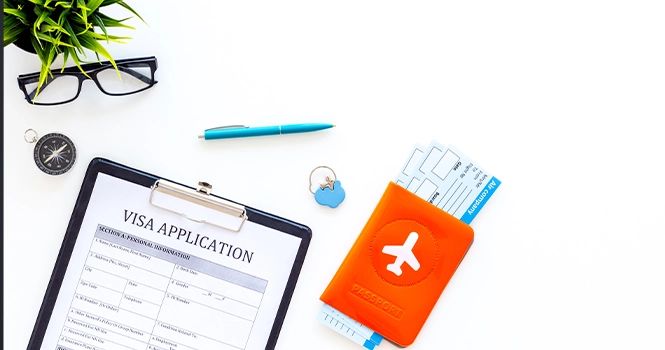
We give professional advice and help throughout the visa application process as part of our visa aid services, which are available to anybody needing a visa for any country. This guarantees a simple and hassle-free experience for our clients. We are here to assist you in navigating the difficulties and requirements of visa applications to make your travel aspirations a reality, whether they be for education, work, leisure, or immigration purposes.


A Canada visa stamped on your passport allows you to enter Canada for a temporary or permanent stay, depending on the decision by the Canadian Consulate or Embassy based on your eligibility and fulfilment of entry criteria.
View Details
An Australian Visa grants permission to visit Australia for a particular amount of time. Unlike many other countries, Australia does not issue physical visa stamps; visa information is electronically recorded on a computer.
View DetailsA visa is a necessary travel document that allows people to enter a foreign nation for a predetermined amount of time. It functions as a permission paper issued by the government of the country, letting the traveler enter and remain inside its borders for a specified duration. For many overseas trips, obtaining a visa is a requirement, and the application procedure can differ depending on the laws, rules, and regulations of the destination nation.
In most cases, passengers are required to apply for a visa before their departure. This procedure normally involves submitting the required paperwork, including passport details, proof of lodging, a travel schedule, and financial resources, to the relevant embassy, consulate, or internet portal. The authorities thoroughly examine the visa application to make sure it complies with the nation's security and immigration regulations. Following approval, the visa, which expressly states the permitted period of stay, is either attached to the passport or issued as an additional document.
There are numerous types of visas available for various types of travel. For some nationalities, some nations also provide visa-on-arrival services, simplifying the travel process for brief trips. Additionally, electronic visas, or "e-visas," are gaining popularity. With an "e-visa," passengers can apply online and receive a visa that they must take with them while traveling.
1
2
3
4
Our team of immigration lawyers and specialists provides personalized support and direction to make your immigration smooth.

We ensure your documents meet all requirements with our document preparation & verification service.

We handle your application, keeping you informed with clear timeframes for each steps.

Rely on our pre & post-landing support, designed to ease the transition and help you settle smoothly in desired country.

Visas can be valid for a short period of time or up to several years, depending on the type of visa and nation. The duration of entry and exit in the foreign country is specified.
The term "visa validity" describes the time frame in which the visa is regarded legally as a document allowing admission into the other country. It begins on the day of issuance and concludes on the expiration day. On the other hand, the term "length of stay" describes the longest period of time a visitor is permitted to stay in a foreign nation after entering with a valid visa.
A digital travel authorization known as an e-visa enables anyone to apply for and be granted a visa online without the need for paper documents. After being accepted, the e-visa is electronically connected to the traveller's passport and needs to be shown when entering the target nation.
If you meet the requirements and desire to visit the US for vacation or business, it is possible to apply electronically for the Electronic System for Travel Authorization- ESTA. It is connected to the passport used for application and has a two-year validity period. A stay of up to 90 days is permitted for each entry, but if the passport expires or is replaced, a new ESTA application is necessary.
The photo from the information page may be electronically copied from passports with the chip emblem on their cover. It is best to take a new photo with your phone or camera and upload it because the quality of the current one might not be adequate for some visa applications. If necessary, the electronic copy can be used as a backup in case of emergency.
Different visa categories support various travel objectives. By purpose, some of the common visa types are as follows:
Tourist visas:
These entry permits, which usually permit stays of up to three months, are given out for leisurely purposes. Travellers can apply for tourist visas numerous times if they are approved by the embassy or consulate, but they do not authorize work activities while holding tourist visas.
Transit Visas:
Transit visas let passengers pass through a certain nation on the way to their final destination. Depending on the transit country, they are typically valid for 24 to 96 hours and occasionally even up to two weeks.
Medical visas:
These visas are available to anyone travelling to another country for medical care. They last only for the length of the medical operation and the recuperation period. Usually, a doctor's certification of health and documentation of medical care received in the country of travel are needed.
Visas for working holidays:
Visas for working holidays let people travel and work at the same time so they can pay for their trip. Eligibility is frequently restricted to people between the ages of 18 and 30, and restrictions on the kind and number of hours of work may be in place.
Student visas:
Issued for academic purposes, these visas are good for the entire length of the study program. Depending on the laws of the country you are visiting, your options for employment may be limited.
Work visas:
People who have a job lined up abroad are eligible for work visas. Depending on the job contract, they are typically granted for longer periods of time, ranging from one to four years or more.
Family Reunification Visas:
These visas enable people to reunite with their spouses who are working and residing abroad. The visa application may also include minor children.
Investment Visas:
Depending on the regulations of the country, investment visas allow people to move to that country and establish residency by making a sizeable financial investment.
Official Visas:
Diplomatic representatives who hold official visas are able to carry out their duties abroad. This category includes diplomatic, service, and courtesy visas.
Refuge or Shelter Visas:
Individuals persecuted in their home country due to religious, racial, or political reasons may apply for refugee or asylum seeker visas in other countries.
Visas for Digital Nomads:
Visas for digital nomads are intended for people who seek to live in a country with a digital nomad immigration program and who work remotely, often for a business or client.
Retirement Visas:
After attaining retirement age, foreign nationals who wish to retire abroad are granted retirement visas. You might need to show proof that you have enough money to maintain yourself.
Pilgrimage Visas:
Pilgrimage visas are provided to those travelling abroad on religious pilgrimages, such as the Saudi Arabian Hajj visa for Muslims travelling to Mecca.
Travellers should examine the precise visa restrictions of their destination country before booking their trip because visa categories and their particular criteria might differ greatly between nations.
Depending on the nation and your nationality, there are three primary routes to obtain a travel visa:
Most frequently, visitors submit a visa application at the embassy or consulate of the nation they wish to visit. The following steps are often included in the process:
Note: Since some nations delegate the processing of visa applications to profit travel firms, applicants may be required to submit their supporting documentation through such organizations, which will then be sent to the relevant embassy or consulate for review.
On several nations' official websites, applicants can submit a visa application. Most of the time, electronic visas come in the form of printable documents that are electronically connected to your passport. The following steps are commonly included in the online visa application process:
In some nations, visitors can apply for a visa at the airport or other specified entry points. This option is known as a Visa on Arrival (VoA). The following stages are often involved in getting a VoA:
Feel free to contact us for your queries
Contact us for your immigration application assistance. Forget all your concerns when we are with you.